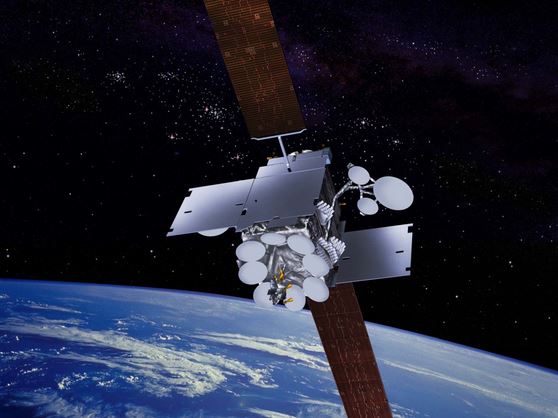British satellite telecommunications company Inmarsat plc announced the successful launch of Inmarsat-5 F2, its second Global Xpress satellite on board a Russian ILS (International Launch Services) Proton Breeze M rocket launched in Kazakhstan (Baikonur Cosmodrome) on Sunday.
A successful spacecraft separation was confirmed by ILS at 04:02hrs GMT on February 2nd.
Over the next few weeks, Inmarsat’s operations team will command the satellite to carry out a series of manoeuvres to raise the satellite to a geo-synchronous elliptical orbit.
Inmarsat says that at the end of February the satellite will have completed deployment of its solar arrays (solar panels) and deflectors.

Inmarsat-5 F2 will form part of a fleet of satellites that will span the world.
The satellite will then go into its electrical orbit-raising phase, taking it to its final geostationary orbit, which is scheduled to be completed by the end of March. It should be ready for payload testing at the beginning of April.
Inmarsat-5 F2 is part of the company’s $1.6 billion investment into the next generation of global mobile broadband communications. The satellite was built by Boeing Satellite Systems International Inc.
Video – Inmarsat Global Xpress
Inmarsat is the commercial operator and owner of the Global Xpress constellation, the first high-speed broadband network that will span the world.
According to the company, it will deliver seamless, globally available, super-high-speed broadband connectivity on land, sea and in the air – provided by a single operator.
Inmarsat’s CEO, Rupert Pearce, said:
“The successful launch of our second Inmarsat-5 satellite by Proton is a significant step forward on our journey to deliver the world’s first globally available, high speed mobile broadband service. Our first GX satellite entered commercial service in July 2014 and has since been delivering an excellent service to our customers in Europe, the Middle East, Africa and Asia.”
“With Inmarsat-5 F3 expected for launch by Proton in the coming months, we are on schedule to achieve full global coverage early in the second half of 2015.”
“This is a great achievement and I would like to pay tribute to the skill and expertise of Inmarsat’s engineering teams and all our employees involved in the design, development, manufacturing, testing and launch. It is their dedication, alongside the outstanding support we have received from our manufacturing and launch partners – Boeing and ILS – which has helped deliver such a successful outcome.”
UK’s Sky News successfully broadcast the first live, on-air transmission via Inmarsat’s new Ka-band satellite network, Global Xpress.
Sky News live stream HD video was broadcast over the GX satellite (Inmarsat-5 F1) broadband network on January 25th from Athens as it covered Greece’s general election.
Video – Launch of Russian Proton rocket with Imnarsat 5-F2 satellite
The Russian Proton Rocket took a rare day time launch on Sunday from Kazachstan. The Proton-M on it’s 402nd mission lofted the British Inmarsat 5-F2 satellite into orbit.

